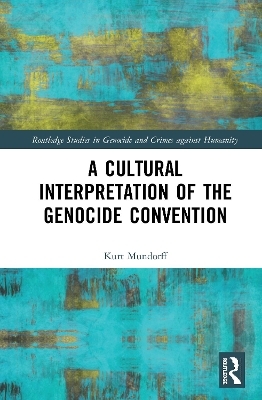
A Cultural Interpretation of the Genocide Convention
Seiten
2020
Routledge (Verlag)
978-0-367-43816-6 (ISBN)
Routledge (Verlag)
978-0-367-43816-6 (ISBN)
This book critiques the dominant physical and biological interpretation of the Genocide Convention and argues that the idea of "culture" is central to properly understanding the crime of genocide.
Using Raphael Lemkin’s personal papers, archival materials from the State Department and the UN, as well as the mid-century secondary literature, it situates the convention in the longstanding debate between Enlightenment notions of universality and individualism, and Romantic notions of particularism and holism. The author conducts a thorough review of the treaty and its preparatory work to show that the drafters brought strong culturalist ideas to the debate and that Lemkin’s ideas were held widely in the immediate postwar period. Reconstructing the mid-century conversation on genocide and situating it in the much broader mid-century discourse on justice and society he demonstrates that culture is not a distraction to be read out of the Genocide Convention; it is the very reason it exists.
This volume poses a forceful challenge to the materialist interpretation and calls into question decades of international case law. It will be of interest to scholars of genocide, human rights, international law, the history of international law and human rights, and treaty interpretation.
Using Raphael Lemkin’s personal papers, archival materials from the State Department and the UN, as well as the mid-century secondary literature, it situates the convention in the longstanding debate between Enlightenment notions of universality and individualism, and Romantic notions of particularism and holism. The author conducts a thorough review of the treaty and its preparatory work to show that the drafters brought strong culturalist ideas to the debate and that Lemkin’s ideas were held widely in the immediate postwar period. Reconstructing the mid-century conversation on genocide and situating it in the much broader mid-century discourse on justice and society he demonstrates that culture is not a distraction to be read out of the Genocide Convention; it is the very reason it exists.
This volume poses a forceful challenge to the materialist interpretation and calls into question decades of international case law. It will be of interest to scholars of genocide, human rights, international law, the history of international law and human rights, and treaty interpretation.
Kurt Mundorff, JD, LLM, PhD, writes on issues of genocide, child welfare, and international legal history. An earlier work on article 2(e) of the Genocide Convention, which prohibits forcibly removing children from protected groups, was published by the Harvard International Law Journal as an article titled "Other Peoples’ Children" (2009). This research is informed by Kurt's experience investigating reports of child maltreatment as a Child Protective Specialist for the City of New York.
1 Introduction 2 Outlines of a Humble Interpretation 3 Lemkin in the Cultural Moment 4 The Tedious Crucible 5 The Trouble with Travaux 6 A History of Exclusion 7 Conclusion
| Erscheinungsdatum | 26.08.2020 |
|---|---|
| Reihe/Serie | Routledge Studies in Genocide and Crimes against Humanity |
| Verlagsort | London |
| Sprache | englisch |
| Maße | 156 x 234 mm |
| Gewicht | 521 g |
| Themenwelt | Geisteswissenschaften ► Geschichte |
| Recht / Steuern ► EU / Internationales Recht | |
| Recht / Steuern ► Öffentliches Recht ► Völkerrecht | |
| Sozialwissenschaften ► Politik / Verwaltung ► Europäische / Internationale Politik | |
| ISBN-10 | 0-367-43816-X / 036743816X |
| ISBN-13 | 978-0-367-43816-6 / 9780367438166 |
| Zustand | Neuware |
| Haben Sie eine Frage zum Produkt? |
Mehr entdecken
aus dem Bereich
aus dem Bereich


